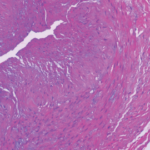A 43-year-old man with a past medical history of type 2 diabetes mellitus, bilateral inguinal hernia repair as a child and prior cholecystectomy woke from sleep with sudden-onset periumbilical abdominal pain. He was admitted to another hospital, but required transfer to our surgical intensive care unit after a recurrent episode of severe abdominal pain, during which he became hypotensive and required vasopressors. He had abnormal labs, including lactate 10 mmol/L (normal: 0.5–2.2 mmol/L). He was a nonsmoker, with a family history notable for one child who had passed away at age 10 from an aneurysmal brain bleed of unclear cause.
On initial exam, the patient was afebrile, with a blood pressure of 108/54, a heart rate of 96 beats per minute and tenderness to deep palpation in the periumbilical region. Noteworthy labs included a white blood cell count of 23.3 103/uL (normal: 3.8–10.8 10E3/uL), hemoglobin of
11.8 g/dL (normal: 13.2–17.1 g/dL), creatinine of 1.36 mg/dL (normal: 0.60–1.30 mg/dL), blood glucose level of 454 mg/dL (normal: 70–100 mg/dL), lactate of 1 mmol/L, sedimentation rate of 4 mm/hr, a C-reactive protein level of 67 mg/L (normal: 0–15 mg/L), antinuclear antibodies of 1:160 (negative: <1:80), normal C3 of 114 mg/dL (normal: 87–200 mg/dL) and low C4 at 15 mg/dL (normal: 19–52 mg/dL). A urinalysis was negative for protein, but positive for trace blood. He tested negative for hepatitis A, B and C, as well as HIV.
A computed tomography (CT) scan of the abdomen and pelvis showed superior mesenteric artery (SMA) dissection, as well as non-occlusive dissection of the left common and external iliac arteries and irregular caliber of the celiac artery, with resolving small bowel ischemia, mesenteric root hemorrhage and moderate hemoperitoneum without a visible cause, such as aneurysm. A CT angiogram of the chest, abdomen and pelvis showed mild ectasia of the ascending thoracic aorta without a dissection flap. Bilateral renal cortical scarring was also seen.
Diagnoses considered in this case included medium vessel vasculitis (e.g., polyarteritis nodosa [PAN]), segmental arterial mediolysis (SAM), fibromuscular dysplasia and collagen vascular disease.
He was started on a heparin infusion by the surgical team, and the rheumatologist recommended starting IV methylprednisolone for a possible diagnosis of medium vessel vasculitis. Exploratory laparoscopy was discussed, but on on the fifth day of his hospitalization, the patient developed chest pain, was noted to be hypotensive and had a cardiac arrest with multiple cardiac arrhythmias, including pulseless electrical activity, ventricular fibrillation and ventricular tachycardia, and unfortunately died.
